Zhaopeng Tu
The Script is All You Need: An Agentic Framework for Long-Horizon Dialogue-to-Cinematic Video Generation
Jan 27, 2026Abstract:Recent advances in video generation have produced models capable of synthesizing stunning visual content from simple text prompts. However, these models struggle to generate long-form, coherent narratives from high-level concepts like dialogue, revealing a ``semantic gap'' between a creative idea and its cinematic execution. To bridge this gap, we introduce a novel, end-to-end agentic framework for dialogue-to-cinematic-video generation. Central to our framework is ScripterAgent, a model trained to translate coarse dialogue into a fine-grained, executable cinematic script. To enable this, we construct ScriptBench, a new large-scale benchmark with rich multimodal context, annotated via an expert-guided pipeline. The generated script then guides DirectorAgent, which orchestrates state-of-the-art video models using a cross-scene continuous generation strategy to ensure long-horizon coherence. Our comprehensive evaluation, featuring an AI-powered CriticAgent and a new Visual-Script Alignment (VSA) metric, shows our framework significantly improves script faithfulness and temporal fidelity across all tested video models. Furthermore, our analysis uncovers a crucial trade-off in current SOTA models between visual spectacle and strict script adherence, providing valuable insights for the future of automated filmmaking.
Too Good to be Bad: On the Failure of LLMs to Role-Play Villains
Nov 12, 2025Abstract:Large Language Models (LLMs) are increasingly tasked with creative generation, including the simulation of fictional characters. However, their ability to portray non-prosocial, antagonistic personas remains largely unexamined. We hypothesize that the safety alignment of modern LLMs creates a fundamental conflict with the task of authentically role-playing morally ambiguous or villainous characters. To investigate this, we introduce the Moral RolePlay benchmark, a new dataset featuring a four-level moral alignment scale and a balanced test set for rigorous evaluation. We task state-of-the-art LLMs with role-playing characters from moral paragons to pure villains. Our large-scale evaluation reveals a consistent, monotonic decline in role-playing fidelity as character morality decreases. We find that models struggle most with traits directly antithetical to safety principles, such as ``Deceitful'' and ``Manipulative'', often substituting nuanced malevolence with superficial aggression. Furthermore, we demonstrate that general chatbot proficiency is a poor predictor of villain role-playing ability, with highly safety-aligned models performing particularly poorly. Our work provides the first systematic evidence of this critical limitation, highlighting a key tension between model safety and creative fidelity. Our benchmark and findings pave the way for developing more nuanced, context-aware alignment methods.
BatonVoice: An Operationalist Framework for Enhancing Controllable Speech Synthesis with Linguistic Intelligence from LLMs
Sep 30, 2025Abstract:The rise of Large Language Models (LLMs) is reshaping multimodel models, with speech synthesis being a prominent application. However, existing approaches often underutilize the linguistic intelligence of these models, typically failing to leverage their powerful instruction-following capabilities. This limitation hinders the model's ability to follow text instructions for controllable Text-to-Speech~(TTS). To address this, we propose a new paradigm inspired by ``operationalism'' that decouples instruction understanding from speech generation. We introduce BatonVoice, a framework where an LLM acts as a ``conductor'', understanding user instructions and generating a textual ``plan'' -- explicit vocal features (e.g., pitch, energy). A separate TTS model, the ``orchestra'', then generates the speech from these features. To realize this component, we develop BatonTTS, a TTS model trained specifically for this task. Our experiments demonstrate that BatonVoice achieves strong performance in controllable and emotional speech synthesis, outperforming strong open- and closed-source baselines. Notably, our approach enables remarkable zero-shot cross-lingual generalization, accurately applying feature control abilities to languages unseen during post-training. This demonstrates that objectifying speech into textual vocal features can more effectively unlock the linguistic intelligence of LLMs.
CDE: Curiosity-Driven Exploration for Efficient Reinforcement Learning in Large Language Models
Sep 11, 2025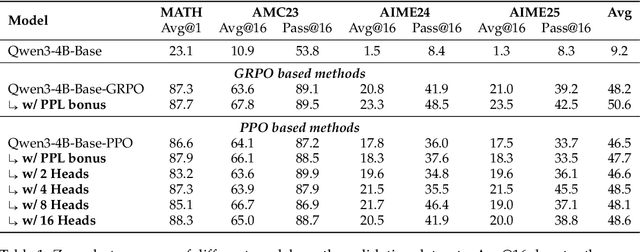

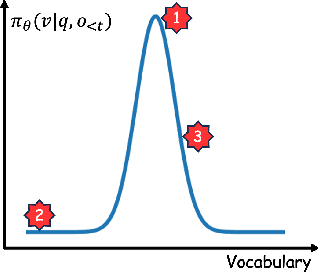

Abstract:Reinforcement Learning with Verifiable Rewards (RLVR) is a powerful paradigm for enhancing the reasoning ability of Large Language Models (LLMs). Yet current RLVR methods often explore poorly, leading to premature convergence and entropy collapse. To address this challenge, we introduce Curiosity-Driven Exploration (CDE), a framework that leverages the model's own intrinsic sense of curiosity to guide exploration. We formalize curiosity with signals from both the actor and the critic: for the actor, we use perplexity over its generated response, and for the critic, we use the variance of value estimates from a multi-head architecture. Both signals serve as an exploration bonus within the RLVR framework to guide the model. Our theoretical analysis shows that the actor-wise bonus inherently penalizes overconfident errors and promotes diversity among correct responses; moreover, we connect the critic-wise bonus to the well-established count-based exploration bonus in RL. Empirically, our method achieves an approximate +3 point improvement over standard RLVR using GRPO/PPO on AIME benchmarks. Further analysis identifies a calibration collapse mechanism within RLVR, shedding light on common LLM failure modes.
RLVMR: Reinforcement Learning with Verifiable Meta-Reasoning Rewards for Robust Long-Horizon Agents
Jul 30, 2025



Abstract:The development of autonomous agents for complex, long-horizon tasks is a central goal in AI. However, dominant training paradigms face a critical limitation: reinforcement learning (RL) methods that optimize solely for final task success often reinforce flawed or inefficient reasoning paths, a problem we term inefficient exploration. This leads to agents that are brittle and fail to generalize, as they learn to find solutions without learning how to reason coherently. To address this, we introduce RLVMR, a novel framework that integrates dense, process-level supervision into end-to-end RL by rewarding verifiable, meta-reasoning behaviors. RLVMR equips an agent to explicitly tag its cognitive steps, such as planning, exploration, and reflection, and provides programmatic, rule-based rewards for actions that contribute to effective problem-solving. These process-centric rewards are combined with the final outcome signal and optimized using a critic-free policy gradient method. On the challenging ALFWorld and ScienceWorld benchmarks, RLVMR achieves new state-of-the-art results, with our 7B model reaching an 83.6% success rate on the most difficult unseen task split. Our analysis confirms these gains stem from improved reasoning quality, including significant reductions in redundant actions and enhanced error recovery, leading to more robust, efficient, and interpretable agents.
CogDual: Enhancing Dual Cognition of LLMs via Reinforcement Learning with Implicit Rule-Based Rewards
Jul 23, 2025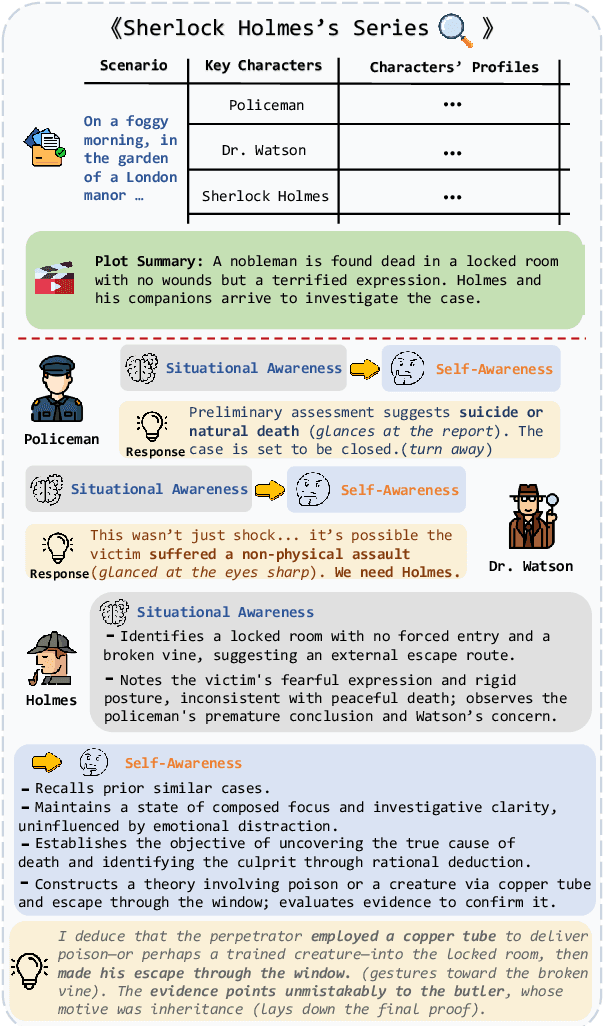
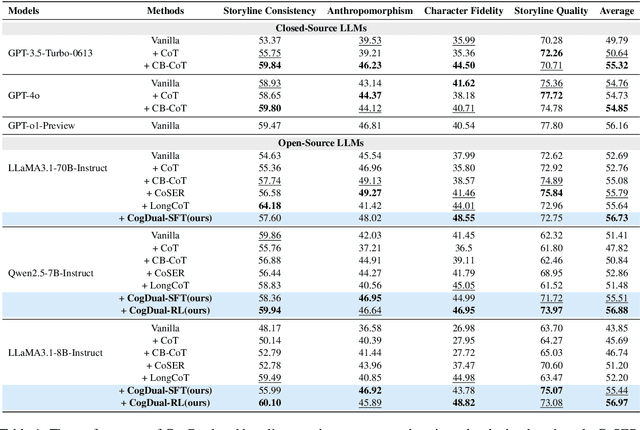
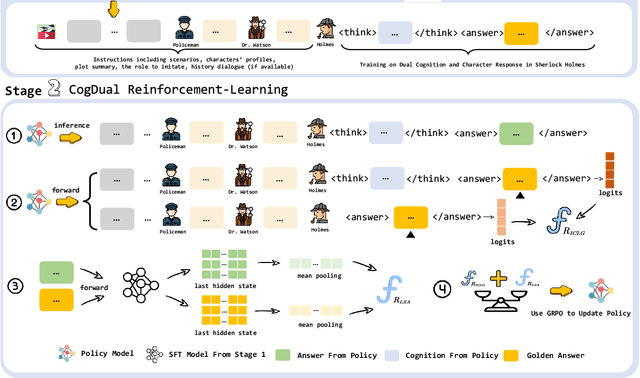
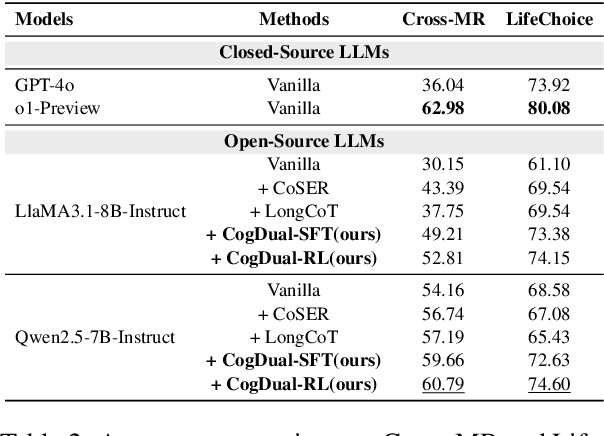
Abstract:Role-Playing Language Agents (RPLAs) have emerged as a significant application direction for Large Language Models (LLMs). Existing approaches typically rely on prompt engineering or supervised fine-tuning to enable models to imitate character behaviors in specific scenarios, but often neglect the underlying \emph{cognitive} mechanisms driving these behaviors. Inspired by cognitive psychology, we introduce \textbf{CogDual}, a novel RPLA adopting a \textit{cognize-then-respond } reasoning paradigm. By jointly modeling external situational awareness and internal self-awareness, CogDual generates responses with improved character consistency and contextual alignment. To further optimize the performance, we employ reinforcement learning with two general-purpose reward schemes designed for open-domain text generation. Extensive experiments on the CoSER benchmark, as well as Cross-MR and LifeChoice, demonstrate that CogDual consistently outperforms existing baselines and generalizes effectively across diverse role-playing tasks.
DeepTheorem: Advancing LLM Reasoning for Theorem Proving Through Natural Language and Reinforcement Learning
May 29, 2025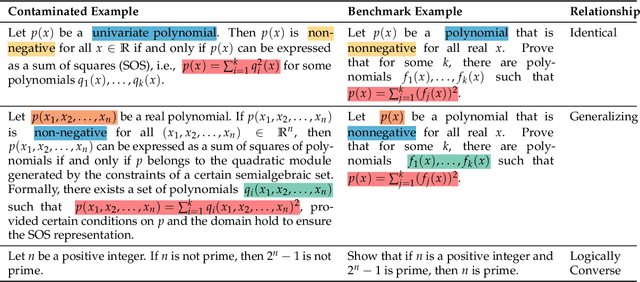
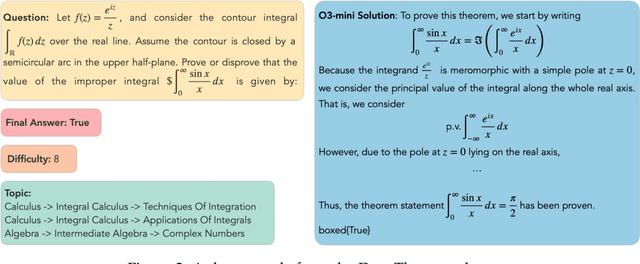
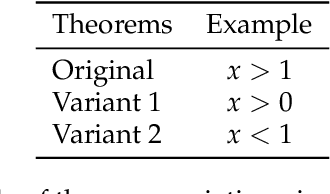
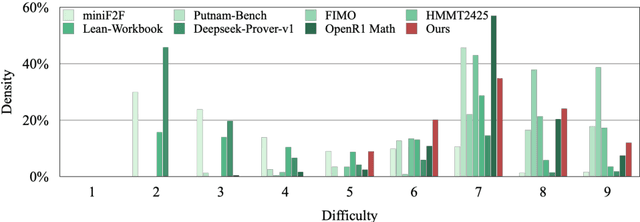
Abstract:Theorem proving serves as a major testbed for evaluating complex reasoning abilities in large language models (LLMs). However, traditional automated theorem proving (ATP) approaches rely heavily on formal proof systems that poorly align with LLMs' strength derived from informal, natural language knowledge acquired during pre-training. In this work, we propose DeepTheorem, a comprehensive informal theorem-proving framework exploiting natural language to enhance LLM mathematical reasoning. DeepTheorem includes a large-scale benchmark dataset consisting of 121K high-quality IMO-level informal theorems and proofs spanning diverse mathematical domains, rigorously annotated for correctness, difficulty, and topic categories, accompanied by systematically constructed verifiable theorem variants. We devise a novel reinforcement learning strategy (RL-Zero) explicitly tailored to informal theorem proving, leveraging the verified theorem variants to incentivize robust mathematical inference. Additionally, we propose comprehensive outcome and process evaluation metrics examining proof correctness and the quality of reasoning steps. Extensive experimental analyses demonstrate DeepTheorem significantly improves LLM theorem-proving performance compared to existing datasets and supervised fine-tuning protocols, achieving state-of-the-art accuracy and reasoning quality. Our findings highlight DeepTheorem's potential to fundamentally advance automated informal theorem proving and mathematical exploration.
Two Experts Are All You Need for Steering Thinking: Reinforcing Cognitive Effort in MoE Reasoning Models Without Additional Training
May 20, 2025Abstract:Mixture-of-Experts (MoE) architectures within Large Reasoning Models (LRMs) have achieved impressive reasoning capabilities by selectively activating experts to facilitate structured cognitive processes. Despite notable advances, existing reasoning models often suffer from cognitive inefficiencies like overthinking and underthinking. To address these limitations, we introduce a novel inference-time steering methodology called Reinforcing Cognitive Experts (RICE), designed to improve reasoning performance without additional training or complex heuristics. Leveraging normalized Pointwise Mutual Information (nPMI), we systematically identify specialized experts, termed ''cognitive experts'' that orchestrate meta-level reasoning operations characterized by tokens like ''<think>''. Empirical evaluations with leading MoE-based LRMs (DeepSeek-R1 and Qwen3-235B) on rigorous quantitative and scientific reasoning benchmarks demonstrate noticeable and consistent improvements in reasoning accuracy, cognitive efficiency, and cross-domain generalization. Crucially, our lightweight approach substantially outperforms prevalent reasoning-steering techniques, such as prompt design and decoding constraints, while preserving the model's general instruction-following skills. These results highlight reinforcing cognitive experts as a promising, practical, and interpretable direction to enhance cognitive efficiency within advanced reasoning models.
Trust, But Verify: A Self-Verification Approach to Reinforcement Learning with Verifiable Rewards
May 19, 2025Abstract:Large Language Models (LLMs) show great promise in complex reasoning, with Reinforcement Learning with Verifiable Rewards (RLVR) being a key enhancement strategy. However, a prevalent issue is ``superficial self-reflection'', where models fail to robustly verify their own outputs. We introduce RISE (Reinforcing Reasoning with Self-Verification), a novel online RL framework designed to tackle this. RISE explicitly and simultaneously trains an LLM to improve both its problem-solving and self-verification abilities within a single, integrated RL process. The core mechanism involves leveraging verifiable rewards from an outcome verifier to provide on-the-fly feedback for both solution generation and self-verification tasks. In each iteration, the model generates solutions, then critiques its own on-policy generated solutions, with both trajectories contributing to the policy update. Extensive experiments on diverse mathematical reasoning benchmarks show that RISE consistently improves model's problem-solving accuracy while concurrently fostering strong self-verification skills. Our analyses highlight the advantages of online verification and the benefits of increased verification compute. Additionally, RISE models exhibit more frequent and accurate self-verification behaviors during reasoning. These advantages reinforce RISE as a flexible and effective path towards developing more robust and self-aware reasoners.
VISTA: Enhancing Vision-Text Alignment in MLLMs via Cross-Modal Mutual Information Maximization
May 19, 2025Abstract:Current multimodal large language models (MLLMs) face a critical challenge in modality alignment, often exhibiting a bias towards textual information at the expense of other modalities like vision. This paper conducts a systematic information-theoretic analysis of the widely used cross-entropy loss in MLLMs, uncovering its implicit alignment objective. Our theoretical investigation reveals that this implicit objective has inherent limitations, leading to a degradation of cross-modal alignment as text sequence length increases, thereby hindering effective multimodal information fusion. To overcome these drawbacks, we propose Vision-Text Alignment (VISTA), a novel approach guided by our theoretical insights. VISTA introduces an explicit alignment objective designed to maximize cross-modal mutual information, preventing the degradation of visual alignment. Notably, VISTA enhances the visual understanding capabilities of existing MLLMs without requiring any additional trainable modules or extra training data, making it both efficient and practical. Our method significantly outperforms baseline models across more than a dozen benchmark datasets, including VQAv2, MMStar, and MME, paving the way for new directions in MLLM modal alignment research.
 Add to Chrome
Add to Chrome Add to Firefox
Add to Firefox Add to Edge
Add to Edge